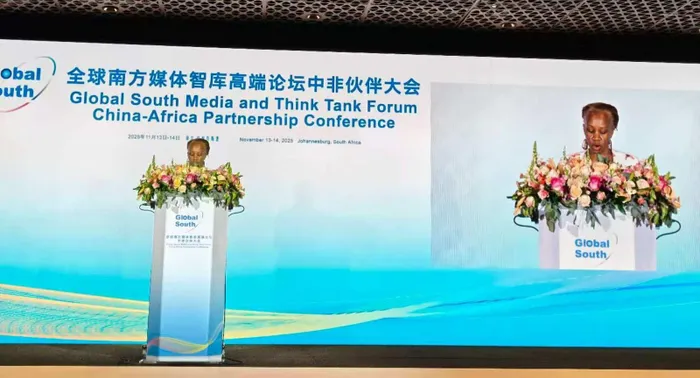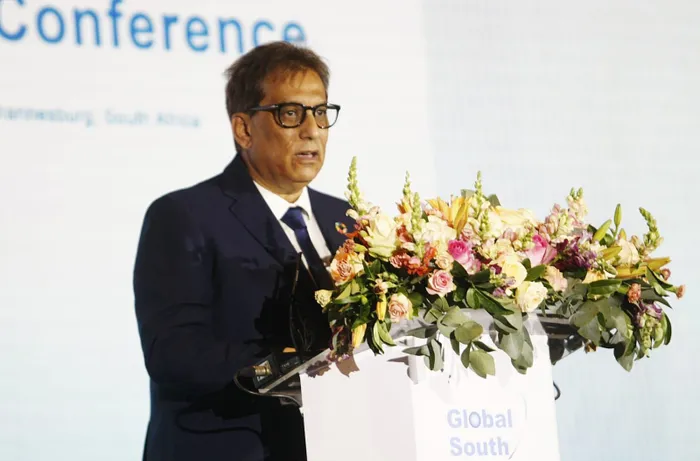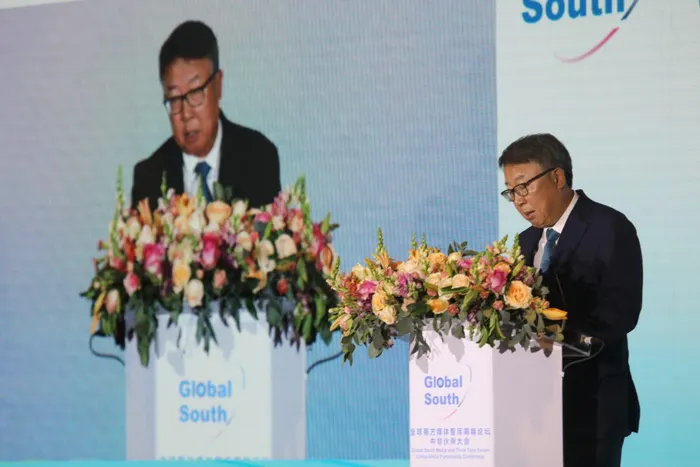Global South Media Forum: African Union calls for strengthening Africa-China ties through shared knowledge

African Union Director of Information and Communication Leslie Richer speaks at the Global South Media Think Tank High-Level Forum and China-Africa Partnership Conference in Johannesburg.
Image: China Mission to the AU/ X
African Union Director of Information and Communication Leslie Richer has emphasised that shared knowledge and honest dialogue are vital to strengthening solidarity across the Global South. She was speaking at the Global South Media Think Tank High-Level Forum and China-Africa Partnership Conference under way in Johannesburg this week.
Richer said the gathering came at a time when the world was undergoing deep change — with new centres of economic activity emerging across the Global South and growing demands for fair representation, control over resources, and dignity in development.
“The global order is in transition with centres of economic activity emerging across the Global South and demands for fair representation, control over resources, dignity in development, and for global governance that reflects the realities of the 21st century growing stronger. Africa’s voice is central in this effort," she said.
"The relationship between Africa and China has evolved over decades of solidarity, mutual respect, and shared aspirations for development. Under the Forum on China-Africa Cooperation (FOCAC), we have built frameworks for trade, infrastructure, technology, public health, education, and cultural exchange. These are not symbolic partnerships. They have contributed to expanding opportunities for our citizens and strengthened Africa’s capacity to mobilise financing for development at a time when global systems often deny us affordable capital."
More than 200 representatives from over 160 media outlets, think tanks, government organizations and other institutions from China and 41 African countries, as well as the African Union, are gathered in Johannesburg to engage in discussions under the theme: "Reforming Global Governance: New Roles and Visions for China-Africa Cooperation."
The forum has brought together diplomats, academics, journalists, and policymakers from across Africa and China to discuss the evolving partnership and its role in reshaping international institutions.
The event was also attended by key panelists, including Ambassador of the People’s Republic of China to South Africa, Wu Peng; the Chairman of Independent Media and co-chair of the BRICS Media Forum, Dr Iqbal Survé; Executive Mayor of the City of Johannesburg, Dada Morero; Consul General of China in Johannesburg, Pan Qingjiang; and Lv Yansong, Editor-in-Chief of Xinhua News Agency.

Independent Media chairman Dr Iqbal Survé speaking at the Global South Media and Think Tank Forum in Houghton, Johannesburg.
Image: Timothy Bernard / Independent Media
Richer said Africa and China’s relationship had been built on decades of solidarity and shared aspirations for development. Under the Forum on China-Africa Cooperation (FOCAC), she said, the two sides had expanded opportunities in trade, infrastructure, education, and cultural exchange.
However, she stressed that cooperation must evolve beyond projects and investment to address the global systems that limit fair development.
“We are now entering a phase that requires us to align our partnership with the broader project of reforming global governance,” she said. “The question is not only how we build infrastructure, but how we help reshape the rules and institutions that govern the world.”
Richer called for urgent reform of the United Nations Security Council, noting that Africa remains the only region without a permanent seat despite representing a third of UN member states.
“The time for implementation is now,” she said. “China and Africa, together with partners across the Global South, must insist on a multilateral system that respects the equality of regions, races, and nations.”
She also urged for reform of international financial institutions, arguing that the global economy continues to operate on unfair terms for developing nations.
“Africa cannot achieve its renewable energy transition, its infrastructure agenda, or its digital transformation while borrowing at interest rates up to eight times higher than those paid by wealthier countries. This is neither rational nor just,” Richer said.
The AU official said Africa’s growing representation on global platforms — including its recent admission as a permanent member of the G20 — was a milestone but also a responsibility.
“Representation is not an end in itself. It carries the responsibility to shape the agenda, articulate shared priorities, and convene the Global South around issues that unite us,” she said.
Richer also urged greater focus on human capital and technology transfer, saying Africa must be an active participant in the digital revolution.
“Africa must not remain a passive consumer in this new technological era. We must be co-creators, innovators, and owners of the knowledge and systems that will define the future,” she said.
She highlighted the importance of narrative and cultural cooperation, arguing that the Global South must tell its own stories and challenge the dominance of Western perspectives.
“Too often, the narratives that circulate about our countries are shaped elsewhere,” Richer said. “The Global South must be partners not only in trade, infrastructure, and diplomacy, but also in storytelling. Shared knowledge reduces stereotypes, and honest dialogue strengthens solidarity.”
In closing, Richer said the future of global governance would not be determined by chance but by those willing to imagine a fairer world and act together to build it.
“We must aspire to a world that is inclusive, equitable, and peaceful — a world where development is a right, not a privilege,” she said. “The reforms we seek for The Africa We Want are not ours alone. They are for a world where every region and every people has the right to define its future with dignity.”

Chinese Ambassador to South Africa Wu Peng addressing the Global South Media Think Tank High-Level Forum and China-Africa Partnership Conference in Johannesburg.
Image: Timothy Bernard/ Independent Media
Earlier, in his address, Ambassador Wu Peng hailed the “remarkable rise of the Global South” as one of the defining features of the modern era.
“Today, the Global South accounts for over 40% of the global economy and contributes 80% to global economic growth. It has become a key force in safeguarding global peace, driving global development, and improving global governance,” Wu told the hundreds of delegates.
“As the world’s largest developing country and the continent with the most developing nations, China and Africa share a similar history of anti-colonialism and anti-hegemony, as well as a common mission of development and revitalization,” he said.
Wu described China and Africa as "natural members and the backbone" of the Global South.
"China and Africa account for one-third of the world’s total population. Without the modernization of China and Africa, there can be no modernization of the world,” he added.
Turning to China-Africa cooperation, Wu recalled the Forum on China-Africa Cooperation (FOCAC) Summit held in Beijing last September, where bilateral relations between China and African countries with diplomatic ties to Beijing were elevated to the level of strategic relations.
“The overall characterization of China-Africa relations has been elevated to an all-weather China-Africa community with a shared future for the new era. The China-Africa relationship is now at its best in history,” he said.
IOL News